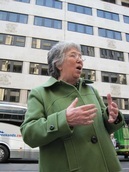Should GPS tagging devices be used on dementia patients?
01-May-13
Suzie Mitchell, police sergeant at Sussex Police

Dot Gibson, general secretary for National Pensioners Convention
To view the results of the poll, you need to vote!
Yes – it stops family carers worrying and keeps patients safe
Sussex Police has joined a number of local authorities in investing in GPS tagging devices for dementia patients that can be worn around their neck, clipped to a belt or put on a set of house keys.
It works through a Global Positioning System (GPS) – a space-based satellite navigation system that is used by 'sat-navs' in vehicles. It is also linked to a 24/7 response service which the wearer can call at a press of a button. Family and friends can log into the system whenever they like to find out where the person is.
Police are called out on a regular basis to search for dementia patients who have gone missing and it is costly for police and also extremely worrying for the patients’ family and friends. This problem looks set to grow as the number of people with dementia in the UK increases.
Sergeant Suzie Mitchell believes the scheme will make a huge difference to people in Sussex. She said: “We regularly have to search for missing people with dementia.
“It is heartbreaking to see the torment that their families are put through – and to see the impact it has on the person with dementia when they are found. We are really excited about our involvement in this project and the difference this could make to local people.”
Chief Inspector Tanya Jones added: “The GPS will be very cost-effective to the police. It will reduce anxiety for the family and really reduce the police time spent on this issue.”
No – using tags on dementia patients is treating like criminals
The National Pensioners Convention (NPC) has condemned the move as “just about saving money rather than treating people with dignity”.
Dot Gibson, NPC general secretary said: “This action shows how the social care system has completely collapsed. Councils have had a 30 per cent cut in funding and older people are now slipping through the gaps in the system. There has been a lot of talk about pensioners having escaped the austerity measures, but the effects on older people are actually often hidden and they are suffering in silence.
She added: “This is trying to solve a human problem with technology. Rather than tagging people we need better social care out in the community. Dementia patients need human interaction not tagging. Using electronic tags on dementia sufferers raises very important issues about the individual’s human rights. They haven’t committed any crime – they’ve just grown old. Older people are effectively being demonised and treated like criminals.”
Neil Duncan-Jordan, national officer of the National Pensioners Convention, called the practice “inhumane” and said: “It smacks of criminality” and puts them “on a par with common offenders or people with Asbos. We should not be looking at dementia sufferers in that way.”
“There has got to be a more humane way of coping with somebody’s mental state, and, if it has got to that extreme level, it does beg the question: are there not proper facilities to care for people when they have severe cases of dementia?”
Latest Debate News
03-Jun-16 Will the health and social care sector be better off when the UK leaves the EU?03-Sep-15 Should assisted dying be legalised in the UK?
22-Oct-14 Should GPs be given a financial incentive to diagnose dementia?
04-Apr-14 Should all disabled adults be exempt from the bedroom tax?
03-Apr-14 If face to face GP appointments are replaced by Skype will it further isolate people who are housebound?